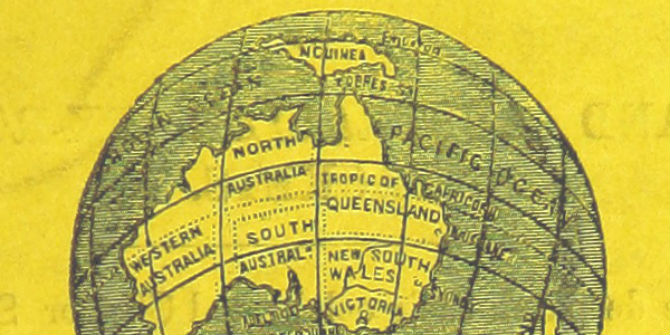
 Talk of ‘Global Britain’ has revived CANZUK – a proposed alliance of Canada, Australia, New Zealand and the UK, sharing some of the principles of the EU. Duncan Bell and Srdjan Vucetic discuss the history of the idea and argue that it is impossible to isolate it from its colonial origins.
Talk of ‘Global Britain’ has revived CANZUK – a proposed alliance of Canada, Australia, New Zealand and the UK, sharing some of the principles of the EU. Duncan Bell and Srdjan Vucetic discuss the history of the idea and argue that it is impossible to isolate it from its colonial origins.
It was coined in the 1950s, but the term CANZUK – a union (or alliance or pact) of Canada, Australia, New Zealand, and the United Kingdom – has been repurposed in the wake of the Brexit vote. Rallying behind it is a small but well-connected network of pro-Brexit politicians, policy-makers, journalists, and business leaders, who argue that since these countries already have so much in common, a globe-spanning zone of free movement of goods, services, and labour is a viable proposition. Some of them argue that further integration, with a new defence pact and even a transcontinental (con)federal polity, is both feasible and desirable.

This CANZUK argument deserves our attention. Together with developments such as the US retreat into unilateralism and the rise of the nativist right, the UK’s withdrawal from the EU is spawning new political possibilities and reconfiguring our geopolitical imaginaries. Yet, rather than “something completely new,” as its advocates argue, CANZUK is in fact remarkably old. Its conceptual roots, and many of its animating concerns and ideas, emerged during the imperial debates of the late 19th and early 20th century. Its revival reveals much about the character of policy thinking among conservatives within the so-called English-speaking world today.
A new union?
CANZUK supporters have already developed a loose transnational advocacy network, establishing grassroots campaigning organisations, publishing policy documents, creating social media platforms, and recruiting prominent intellectual entrepreneurs to proselytise the idea. American entrepreneur James Bennett was the first to (re)deploy the term. In a USA Today op-ed published hours after the Brexit vote in 2016, he called CANZUK “the kind of partner America had always hoped the EU would be but which never showed up in reality.” In the UK, two Brexiteers made the same argument around the same time: Andrew Lilico, a Tory think-tanker and economist, who served as an advisor to the Leave campaign, and the historian and journalist Andrew Roberts, who has touted “a CANZUK Union” as “one of the global great powers” and a “pillar of Western civilisation”. The idea has since piqued interest among several politicians and think tankers, including Conservative MEP Daniel Hannan (a well-known Brexit campaigner) and Tim Hewish, who in 2015 oversaw the merger of his conservative Eurosceptic outfit Commonwealth Exchange with the venerable Royal Commonwealth Society.
Outside the UK, the quirky Act New Zealand Party endorsed CANZUK early, as did a handful of Australian politicians. The strongest endorsement yet has come from the Conservative Party of Canada. Last August, its policy wonks adopted a resolution for realising the following objectives “among CANZUK countries”:
“a) free trade in goods/services;
b) visa-free labour/leisure mobility for citizens, including retirement relocation;
c) a reciprocal healthcare agreement modelled on existing AU/NZ/UK bilaterals;
d) increased consumer choice/protection for travel;
and e) security coordination.”
(The party leader, Andrew Scheer, just happens to be an admirer of Hannan and a supporter of Brexit.) So, in contrast to the more overarching idea of “the Anglosphere” that Bennett and others popularised in the early 2000s, CANZUK appears to be of interest to at least some politicians, and not just the usual range of Anglophone neoliberal think tanks and news media outlets.
Old wine in new bottles
In an article forthcoming in The British Journal of Politics and International Relations, we place the emergence of CANZUK as a political category in historical context, highlighting the connection between plans for uniting English-speaking polities and late 19th century debates over settler colonialism. It was during the 1880s and 1890s, in particular, that plans to consolidate the settler empire assumed a central position in British political argument (and a much more limited one in the settler colonies). Many leading thinkers, politicians, journalists, and imperial administrators, obsessed over how best to organise “Greater Britain.” The idea of an “imperial federation” encompassed adherents to a broad spectrum of positions, some complementary, others contradictory, but with a common focus on recalibrating relations between Britain, Australia, Canada and New Zealand. Like their heirs today, advocates of imperial federation indulged in techno-utopian fantasies, premising their arguments on the ability of technological change to fundamentally transform the meaning of political identities and the nature, scope, and scale of institutions.
Other British imperial territories were ignored, although it was occasionally suggested that at some unspecified future date, they might warrant inclusion, once they had reached the requisite level of “civilization.” The discourse of imperial federation reinforced the dominant racialised conception of empire, insisting on the distinctiveness and superiority of the “core” white settler colonies. It formed part of a concerted transnational effort to secure and stabilise “white” rule globally, the chief practical manifestation of which was the erection of racialised immigration controls in the United States and British settler colonies. Though plans for formal colonial union fell flat, they nevertheless succeeded in shifting elite British attitudes about the significance of the settler colonies. This remained a prominent feature of British political debate throughout much of the 20th century, as Michael Kenny and Nick Pearce have recently shown.
Seen from this perspective, while the vocabulary of “kith and kin” unificationism evolved over time, from “the Anglo-Saxon race” to the “English-speaking peoples” to the “Anglosphere,” most of the basic ideas have not. We think it essential to acknowledge this historical trajectory for two reasons. First, such recognition helps us situate CANZUK in the history of British political ideology, highlighting its notable precursors and its evolution. Dreams of settler colonial unity, whether Victorian or contemporary, reveal much about the ideological practices of the British political elite.
This history also helps explain the idea’s magnetic appeal to some – and fierce rejection by others. In particular, it explains why so many critics see CANZUK as a problematic reincarnation of the old “white” colonial world. CANZUKers, unsurprisingly, are keen to insist that their project has a very different foundation. Although the imperial origins of the idea do not determine its meaning today, they do condition it, shaping the reception of CANZUK projects.
Proponents of CANZUK cannot escape this troubling past, however hard they might try. To imagine otherwise is politically myopic.
- This blog post first appeared at LSE Brexit.
Please read our comments policy before commenting
Note: This article gives the views of the author, and not the position of USAPP– American Politics and Policy, nor of the London School of Economics.
Shortened URL for this post: http://bit.ly/2CMUkmk
About the authors
 Duncan Bell – University of Cambridge
Duncan Bell – University of Cambridge
Duncan Bell is a Reader in Political Thought and International Relations in the Department of Politics and International Studies, University of Cambridge.
 Srdjan Vucetic – University of Ottawa
Srdjan Vucetic – University of Ottawa
Srdjan Vucetic is an Associate Professor of Public and International Affairs at the University of Ottawa.




To put this article in some perspective, more British expats live in New Zealand on the other side of the world, than next door in the Republic of Ireland. I think this is case of the great British public giving the Canzuk concept a Vote of Confidence with their feet.
Who are the British élites, please, referred to here? Are they the folks like Winston Churchill, who was happy to hand over Australasia to the Japanese élites, in WW2? Or are they the denizens of the City, who have no allegiance to any country?
In reality, Canada, Australia and New Zealand are U.S. military outposts. They are firmly “over here”. The real (as in, non think-tank reality) strategic exigencies, pertinent to the Pentagon, are not very responsive to the tides of isolationism, to which America is periodically subjected. (sic) For the Pentagon to hand over its foothold in these countries, the British élite, whoever they are, would have to do more than ask it very nicely. This would occasion major collateral damage, in these really, quite small countries.
Perhaps the British élite should have thought of this in 1973, when they happily dropped their colonies in the doo-doo, haring away for a one-night stand with Europe?
As a Canadian citizen of Indian origin, I will oppose this. There is already talk of excluding naturalized citizens from the benefits of such a union and not surprising, given that its backed by conservatives. I dont want to be a 2nd class Canadian, and so I will oppose this.
HT
My step father is a naturalized citizen from India here in the UK as is my cousin.
Where is this talk if excluding naturalized citizens?
I have seen none and I seriously doubt it exists.
Canada, Australia, New Zealand and the UK are all highly successful ethnically diverse countries.
To me it’s a great idea and we can all communicate due to a common language which makes the freedom of movement useful at least.
The only elites I see here are the writers of this article.
Response to ht
Naturalized citizens have the exact same rights as all citizens and cannot be excluded in this fashion. (Ergo, you should not oppose this, as it only increases your opportunities.)
I disagree about naturalized citizens having the same rights. It was in 2015 that Conservatives under Harper introduced the ‘intent to reside’ provision in citizenship law. Because of this, it was possible to revoke the citizenship of a naturalized citizen if it was determined that they did not intent to reside in Canada after getting citizenship. Thankfully, the Liberals repealed this.
How would freedom of movement under Canzuk play with such provisions? If Cons have their way, naturalized citizens better stay put in Canada and dare not move for personal benefit.
In addition, if CANZUK does happen, I predict that most people who will actually move countries is recent immigrants. This is because they have fewer ties to their adopted country and will be more willing to move for better job or climate opportunities. When this happens, naturally, it will be seen as ‘citizenship shopping’ or some other ‘abuse’ of the system. This will lead to restrictions on naturalized citizens.
Of course, none of these restrictions will be racist. But, conveniently, 90% of those affected will be non-white.
Informed American analysis of Canadian and British affairs is socially useful for both countries. Thank you. I am a British born Canadian citizen with a Canadian accent now resident in the UK. I voted to remain in the Brexit referendum. I find that whenever I am overly vocal about my British origins in Canada people, such as Mr ht who posted above, get defensive. Hence I mention them cautiously. The reason such idiocy gets peoples backs up is that CANZUK and other white nationalist stupidity. suggests that there is type A Canadian of British stock, and a type B of some token minority who should be thanking us for allowing them to stay. Hence the attitude undermines people’s identify. CANZUK is not a set of proposed freedoms. It is a set of restrictions on trade and immigration. I actually hope the Conservative Party of Canada will be daft enough to use it in their electoral platform. They just might collapse their vote.
This article is clearly biased. CANZUK is economic union and not a political union. As a minority canadian, I believe CANZUK is a great idea and will bring economies of scale to all 4 countries involved. The authors of this article may have their own motives to oppose this arrangement. A large domestic market would help companies in CANZUK area compete with other companies across the world. All fours countries in the CANZUK arrangement are western parliamentary democracies and we have so much in common including similar living standards. All the 4 countries are also economically and geographically diverse and hence they would provide a hedge against downtown turns in one geographical region. Canada is close to USA – the largest english speaking export market. Australia and NZ are closer to fast growing Asian markets. UK is close to EU another large market. We can also have a effective utilization of people with professional and special skills. Consider an IT professional with a specialized skill. All the 4 countries sperately provide very small job market. But together they provide a very large market. People from Australia and NZ who want to take advantage of the IT nearshore boom in Toronto – waterloo corridor due to proximity of USA can come and work here. Retirees from Canada and UK who want better weather can invest in real estate in Australia / NZ. All in all this a win-win idea.Unlike an arrangement with EU , UK will not see a large influx of cheap labor with this arrangement. I wonder if authors of this article want to create a false narrative for publicity.